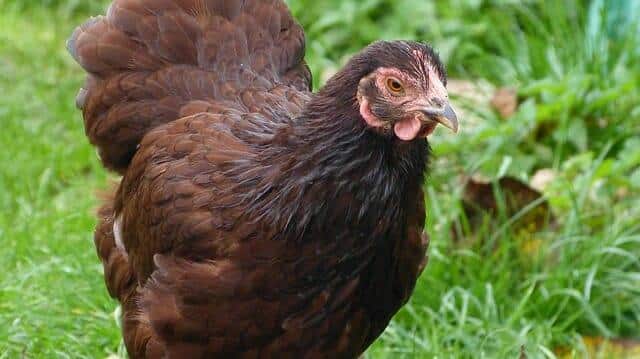A few weeks ago, I went out to the chicken coop to feed and water my birds. I was shocked to find one lying lifeless on the floor, with no obvious sign of illness or injury.
With a population of about a dozen hens and two roosters, all of which are New Hampshire Reds, I was familiar with all the common chicken diseases. Fortunately, none of them have ever affected my flock, largely because most poultry-borne illnesses are spread by the introduction of new members to the flock from outside the farm. We had lost chickens due to aggressive roosters, weasels and infected legs due to some unintelligently placed bands. Yet we had never had a chicken drop dead without experiencing any symptoms or signs of trauma.
However, despite the basic knowledge I had in all the reasons a chicken could die, I had no idea what would cause a seemingly healthy bird to just drop dead out of nowhere. This led me to conduct a mini-research project, in which I found a variety of causes for “sudden chicken death syndrome.”
1. Heart attack
This is most common in fast-growing breeds like Cornish crosses. This is usually due to overstress on their fragile systems, and can happen if these birds grow too largely, too quickly. Certain breeds of chickens are more predisposed to heart attacks based on their bone structure and the origin of genetic, microscopic lesions in their heart muscles.
Diatomaceous Earth: The All-Natural Livestock De-Wormer!
Heart attack can be prevented by butchering broiler birds as soon as they are large enough to do so. Overweight birds are just as unhealthy as overweight humans, and will suffer a myriad of health problems as a result. You should also provide your chickens with plenty of space to roam about. This will help ensure that they get enough exercise to remain healthy.
2. Invisible diseases and parasites
This killer can easily be determined if you “autopsy” your chickens once they have died. Common parasites include worms, mites, lice and other organisms. One disease, coccidiosis, spreads through the feces of the birds and is common in closely confined flocks.
Another common disease is mycoplasma. This illness isn’t without symptoms; birds will often experience sneezing and eye inflammation. However, although it prevents signs, these are easily missed in a large flock. Maintaining a clean coop and other living spaces can help prevent this disease.
3. Accidental poisoning
Chickens can easily become poisoned by common foods they pick up while free-ranging. From small pieces of plastic to bits of tomato plants, there are so many materials that can prove to be toxic to chickens. This toxicity comes on rapidly, and often, the chicken shows no sign of digestive upset or distress before it dies.
4. Trauma
This cause of death doesn’t usually present without signs of injury on a chicken’s body, but it can happen if a chicken has internal damage to its organs. Chickens fight, and can end up accidentally killing each other. Chickens can run into things, damaging their heads, or even fall from a deadly height. Chickens can also be trampled or squashed by larger birds if they are living in close confinement.
There’s not much you can do to prevent this besides making sure you have enough space for your chickens to coexist in peace. If your chickens are free-ranging, four square feet per bird is enough space. However, those that are inside all the time need about 10 square feet each.
5. Impacted crop
An impacted crop is caused by a piece of material, such as straw or dried grass, getting stuck in a tangled mess (kind of like a hairball in cats) inside the crop. This prevents the material from moving to the stomach and can cause symptoms such as lethargy, refusal of food, and excessive drinking. If left untreated, it can lead to conditions such as sour crop and pendulous crop, and, ultimately, death, as the chicken will not willingly eat.
This can be prevented by feeding lots of grit, as well as providing access to free-range acreage so that they can access natural grit-like materials on their own. Pay attention to your birds for signs of fatigue and a refusal to eat, and you will hopefully catch any signs of impacted crops before they become lethal.
6. Egg bound
Because none of our other birds became sick, we ultimately determined our chicken’s cause of death to be the impaction of an egg between her shell gland and vent. At the time, our chickens were laying massive eggs, and we believe this particular hen just so happened to be so unlucky that she could not lay the stuck egg.
Preventing chickens from becoming egg bound can be difficult, but common causes include calcium deficiency and excess weight. Again, providing your chickens with a healthy diet, plenty of room to room, and a clean, living space help to prevent this unfortunate occurrence. Also, make sure you have enough nesting space (such as nest boxes) for all your laying hens. If they must wait too long to lay, this can result in a stuck egg.
While there’s not much you can do to prevent all chicken deaths, maintaining a clean, spacious coop is a good step to ensuring the health of your flock. Give your birds access to plenty of high-quality, nutritious feed and clean water, and you’ll significantly reduce the likelihood of sudden chicken death.
What would you add? Share your thoughts in the section below:
 Off The Grid News Better Ideas For Off The Grid Living
Off The Grid News Better Ideas For Off The Grid Living




